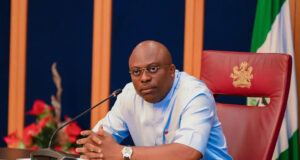His Royal Majesty, Nnaemeka Achebe, the Obi of Onitsha, has called on Nigeria’s political leaders to place the nation’s interest above personal ambitions, warning that the country’s future is at risk due to rampant corruption.
Speaking at the public presentation of Bold Leap, a book written by Senator Chris Anyanwu, in Abuja, the Obi likened the country’s situation to a cow being continually milked without replenishment—saying the cow would eventually die if the corrupt practices continued.
He lamented the greed and lack of accountability within the political class, stressing that Nigeria’s progress could only be ensured if leaders prioritized the country’s welfare over personal and sectional interests.
“If we continue milking the cow, it will eventually die,” the Obi warned. “We’ve been talking about this issue for years, but now is the time for action. We have two choices: either we keep exploiting the country until it collapses or we choose to place Nigeria’s interest above everything else.”
He emphasized the urgency of the situation, noting that time was running out. “We have the opportunity to either accelerate the country’s decline or turn things around quickly,” he stated.
The event, which marked the launch of Senator Anyanwu’s autobiography, Bold Leap, was attended by numerous dignitaries, including former Presidents Olusegun Obasanjo and Goodluck Jonathan, as well as other political figures, traditional rulers, and captains of industry.
The book is divided into three parts, spanning 600 pages and 19 chapters.
President Bola Tinubu was represented by the Minister of Special Duties and Inter-Governmental Affairs, Zaphaniah Jisalo. Former Senate Presidents, former governors, and influential leaders, such as the Emir of Kano, Sanusi Lamido Sanusi, and Peter Obi, also graced the occasion.
During a panel discussion on “How Do We Fix Nigeria: System, Structure, Institutions, and Leadership?”, former Ekiti State Governor, Dr. Kayode Fayemi, sharply criticized Nigeria’s current political system, describing it as “electoralism” rather than true democracy.
He argued that the system’s failures were compounded by a lack of national vision and a failure to forge a national consensus.
Fayemi stressed the need for a clear direction, saying, “Every nation that seeks development starts with a national vision. We need to ask ourselves: who are we? What do we want for Nigeria in 10, 20, or 50 years?”
Briggs, another panelist, echoed the call for political restructuring, pointing out flaws in the electoral process. She criticized the Independent National Electoral Commission (INEC) for its failures, especially in ensuring voter participation and fair representation.
“INEC has let us down,” Briggs said. “When people have voter cards but cannot vote, they are not truly choosing their leaders. It’s a fundamental problem. If the people can’t select their leaders, then those in power owe them nothing.”
She also lamented the lack of genuine patriotism in the country, saying, “Patriotism isn’t just about singing the national anthem. It’s about what you do for your country and what your country does for you.”
Senator Enyinnaya Abaribe joined the discussion, calling attention to the failure of Nigeria’s institutions.
He cited a recent case where a public official who embezzled N23.2 billion was lightly punished by the court, highlighting the weakness of the judicial system in holding corrupt individuals accountable.
“We can’t build strong institutions if we don’t have the right people in positions of power,” Abaribe remarked, criticizing the leniency shown to those guilty of corruption.
Dr. Aminu Gamana also addressed the need for a cultural shift, stressing that the country needed a fundamental reorientation in its values.
He warned that until Nigerians began to demand more from their leaders and actively participate in the political process, elections would remain a mere formality with little to no real change.
“We need to re-educate ourselves as a society. If this continues, people will keep voting for leaders who offer them small handouts like indomie and spaghetti, instead of those who truly care for their future,” Gamana said.

















